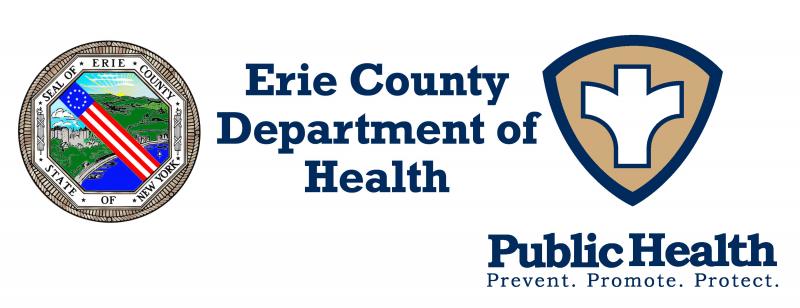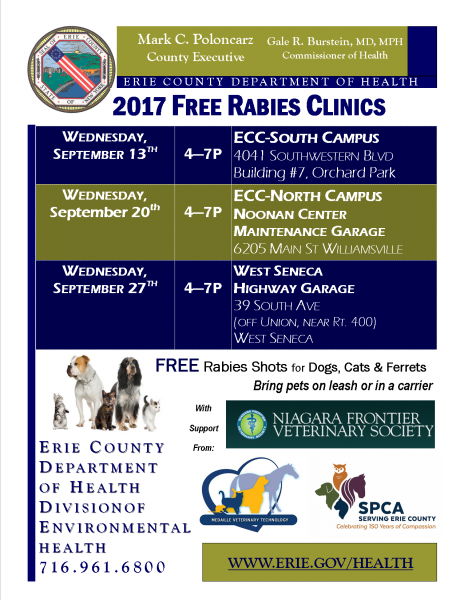Modified: August 22, 2017 3:14pm
Latest News

PRESS RELEASE
From the Office of the Commissioner of Health, Dr. Gale R. Burstein
Date August 23, 2017
CONTACT: Mary C. St. Mary/Mary.StMary@Erie.Gov
Phone: 716.858.4941/ Mobile: 716.253.3925
3 Rabies Vaccination Clinics in September
Last Opportunities in 2017 to Have Your Pets Vaccinated for Free
ERIE COUNTY, NY—The Vector Control and Rabies Prevention team from the Erie County Department of Health’s (ECDOH) Division of Environmental Health is hosting three rabies vaccination clinics in September. These are the last free clinics until January 2018.

“In approximately three hours’ time, several hundred (dogs, cats and ferrets) will receive vaccinations that will protect them from the fatal threat of rabies. This is an extremely valuable service offered to our community,” stated Dr. Gale Burstein, Erie County Commissioner of Health. “In addition, year-round we continue to educate Erie County residents on the very real risks of encountering rabies through exposure to wildlife that that has been exposed to the rabies virus, and the subsequent life-threatening consequences to both humans and pets. Cost should not be a factor to protect your pets and family from an extremely preventable risk.”
Erie County Department of Health: How to Protect Against Rabies
•Do not feed, touch or adopt wild animals, stray dogs or cats. Assume all wildlife & feral animals are rabid.
•Be sure your pet dogs, cats and ferrets and horses and valuable livestock animals are up-to-date on their rabies vaccinations. Vaccination protects pets if they are exposed to rabid animals. Pets too young to be vaccinated should be kept indoors and allowed outside only under direct observation.
•Keep family pets indoors at night. Do not leave them outside unattended or let them roam free.
•Do not attract wild animals to your home or yard. Keep your property free of stored bird seed or other foods that may attract wild animals. Feed pets indoors. Tightly cap or put away garbage cans. Board up any openings to your attic, basement, porch or garage. Cap your chimney with screens.
•If nuisance wild animals are living in parts of your home, consult with a nuisance wildlife control expert about having them removed.
•Teach children not to touch any animal they do not know and to tell an adult immediately if they are bitten or scratched by any animal.
•If a wild animal is on your property, let it wander away. Bring children and pets indoors and alert neighbors who are outside.
Report all animal bites or contact with wild animals:
ECDOH Vector Control, 716.961.6800 M-F Business Hours 716.961.7898 Evenings/Weekends
“We could not accomplish this without the valuable assistance of volunteers from the Niagara Frontier Veterinary Society veterinarians and Medaille College’s Veterinary Technology program’s veterinary technologists who safely and efficiently vaccinate pets--in what can be a stressful environment for the animals,” said Peter Tripi, Senior Public Health Sanitarian. “Our volunteers from the SPCA serving Erie County and the Specialized Medical Assistance Response Team (“SMART”) volunteers then efficiently complete the necessary documentation in short order.”
All clinics are from 4-7pm. Owners are requested to bring a record of the pet’s most recent rabies vaccination, if available. Pets should be non-aggressive to other animals, under the owner’s control, and on a tight leash or in a secure carrier. Additional information on the clinics can be obtained by calling (716) 961-6800.
# # #
For More Information:
Erie County Department of HealtNew York State Department of Health
New York State Department of Health—Rabies fact sheet

